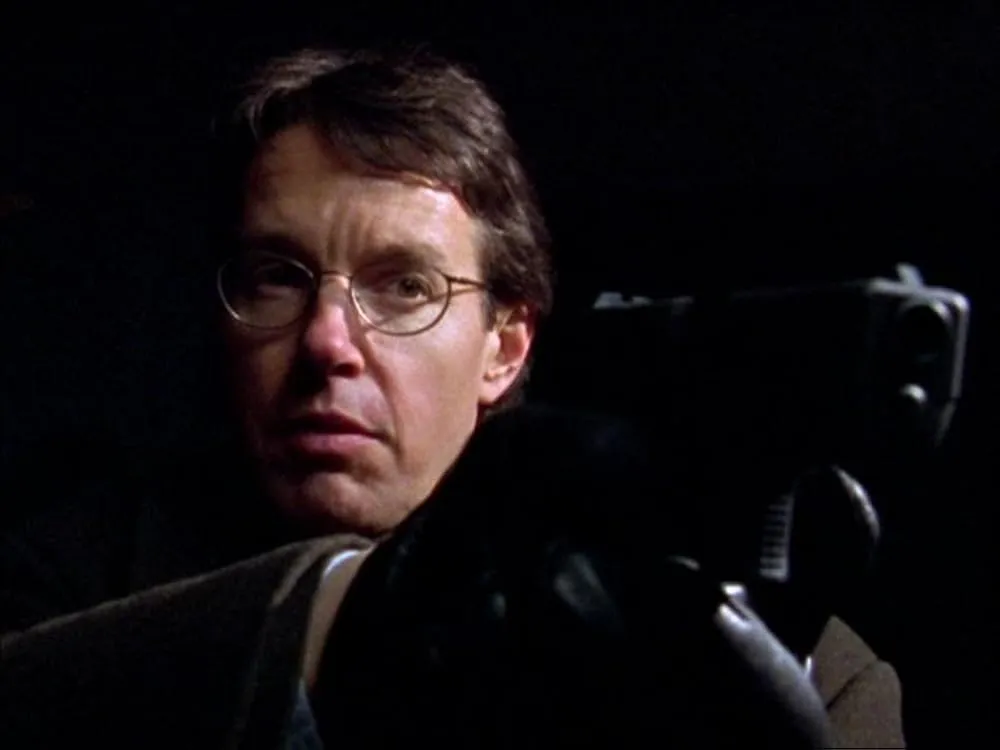
Zen and the Art of Murder (S07E017)
Airdate: 2 April 1999
Written by: Lloyd Rose
Directed by: Miguel Arteta
Running Time: 44 minutes
By the time Homicide: Life on the Street reached its seventh and final season, the show had drifted far from the unvarnished, documentary-style realism that once made it a landmark of American television. The early 1990s episodes, with their raw, fly-on-the-wall portrayal of Baltimore’s mean streets, had been replaced by increasingly conventional crime-drama tropes—formulaic investigations, heightened emotional stakes, and a reliance on plotlines that prioritized melodrama over grit. Yet within this decline, rare episodes emerged that recaptured the series’ original spirit. Zen and the Art of Murder, airing in Season 7, is one such standout. It defies the season’s mediocrity through its nuanced exploration of moral ambiguity, its unflinching realism, and its refusal to succumb to tidy resolutions.
The episode’s central case revolves around the murder of Roshi James Felder, a Buddhist monk discovered bludgeoned to death in the Temple of the Shining Pearl, a house of worship located in a run-down Baltimore neighbourhood. The unlocked temple suggests the victim knew his killer, and the investigation is assigned to Detective Meldrick Lewis, though he resists partnering with Detective Tim Bayliss—a fellow Buddhist who admired Felder. Lewis distrusts Bayliss’s objectivity, given the latter’s reverence for the deceased, while Bayliss believes the killer is a mentally unstable homeless man, Larry Moss (Terry Alexander), whom Felder had befriended during his periods of living on the streets as part of his spiritual practice.
Lewis' skepticism stems from evidence that Felder’s congregation harboured resentment toward him. The monk had allegedly scandalized his community by sleeping with young female students, suggesting an insider motive. Yet Bayliss’s instincts prove correct: Moss, armed and unhinged, confronts him at abandoned house, leading to a tense standoff. Bayliss fires in self-defence, killing Moss. Though exonerated, Bayliss grapples with the contradiction between his Buddhist principles—particularly the prohibition against killing—and his duty as a cop. Lwwis' grudging apology for doubting him underscores the episode’s thematic depth, as Bayliss acknowledges a loss of innocence, another layer of trauma in a career already scarred by violence.
The resolution avoids cheap catharsis. There is no epiphany, no return to serenity—only the raw acknowledgment that Bayliss, like the show itself, must confront the messy reality of his role in a world where morality and survival often collide.
Parallel to the Buddhist plotline, Detectives Laura Ballard and Stuart Gharty investigate the murder of Burrell Williams, a young Black man shot in a late-night altercation. Witnesses—a sister, mother, and neighbour—initially agree the shooter was a white man with facial hair, pointing to Jacko Bragg (Scott Longnecker), who had a feud with Burrell over a girl. Ballard and Gharty pursue Bragg, but inconsistencies emerge: the mother and neighbour waver in their certainty, the suspect has a plausible alibi, and physical evidence is lacking. The state’s attorney Danvers declines to prosecute, leaving Burrell’s family to face the harsh truth that justice is often elusive.
This storyline is masterful in its bleak realism. It mirrors the show’s early ethos, where violence is random, and outcomes are dictated by imperfect systems and human fallibility. The script boldly addresses racial dynamics: the witnesses’ inability to definitively identify a white suspect reflects real-world biases in witness reliability. Even as a montage reveals Bragg disposing of the murder weapon—a subtle nod to his guilt—the episode refuses to soften the blow of an unresolved case. The Williams family’s despair is palpable, underscoring the show’s unflinching commitment to depicting the human cost of urban violence.
Season 7 often leaned into contrivances, but Zen and the Art of Murder distinguishes itself through its refusal to sensationalize. The Buddhist case, on paper, could have been a gimmicky “redball” case—exotic and overwrought. Instead, it remains grounded. Felder’s congregation is portrayed as ordinary people with flaws, not villains or caricatures. The killer’s identity—a homeless man mistaking kindness for insult—aligns with the show’s focus on Baltimore’s underclass, where poverty and mental illness fuel violence. Similarly, the Burrell Williams case rejects Hollywood neatness, showing how systemic gaps and human error let perpetrators walk free.
The episode’s tone is consistently bleak, rejecting the redemptive arcs common in later seasons. Bayliss’s trauma and the Williams family’s unresolved grief reflect the series’ original DNA: a world where resolution is rare, and characters are shaped by the weight of their experiences.
Despite its strengths, the episode is marred by the lingering presence of Det. Falsone and Ballard’s ill-conceived romance. Their opening scene, in which they decide to end their affair to protect their careers, feels redundant and tonally jarring. By Season 7, this subplot had become a crutch, distracting from more compelling dynamics. Its inclusion here serves no purpose beyond nostalgia, undercutting the episode’s otherwise serious tone.
Zen and the Art of Murder is a testament to what Homicide could achieve even in its twilight. It balances character-driven drama with unflinching realism, refusing to romanticize either its subjects or the system they inhabit. While not perfect, the episode stands as a reminder of the series’ potential—a fleeting, luminous moment before the curtain fell.
RATING: 7/10 (+++)
Blog in Croatian https://draxblog.com
Blog in English https://draxreview.wordpress.com/
InLeo blog @drax.leo
LeoDex: https://leodex.io/?ref=drax
Hiveonboard: https://hiveonboard.com?ref=drax
Rising Star game: https://www.risingstargame.com?referrer=drax
1Inch: https://1inch.exchange/#/r/0x83823d8CCB74F828148258BB4457642124b1328e
BTC donations: 1EWxiMiP6iiG9rger3NuUSd6HByaxQWafG
ETH donations: 0xB305F144323b99e6f8b1d66f5D7DE78B498C32A7
BCH donations: qpvxw0jax79lhmvlgcldkzpqanf03r9cjv8y6gtmk9